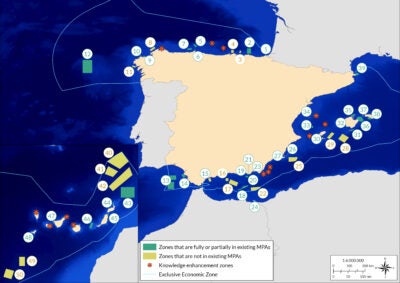Oceana and Seas At Risk urge Spain to create 50 marine sanctuaries to safeguard and restore key ecosystems
Press Release Date: October 10, 2023
Location:
Contact:
Emily Fairless | email: efairless@oceana.org | tel.: +32 478 038 490
Scientific data is available for Spain to help meet the target of 10% strict protection of its waters
Oceana and Seas At Risk are urging Spain to designate 50 marine sanctuaries to move towards the strict protection of at least 10% of its waters by 2030 and contribute to the targets of the EU Biodiversity Strategy. Oceana has carried out an analysis based on its expeditions and other scientific information and has made recommendations to boost the process, as the current percentage of strictly protected areas in Spanish waters is derisory (0.00025%1). Oceana will share the proposal at a seminar with representatives of national governments, European institutions, and scientists in Dublin on 11-13 October. The objective of the meeting is to take stock of the ocean protection commitments of different EU Member States.
Silvia Garcia, senior marine scientist at Oceana in Europe, explained: “As the only EU country with three marine regions and an enormous diversity of habitats and species, it is urgent that Spain creates strict protection areas at sea as soon as possible. It is not just a matter of meeting EU targets, but of being politically far-sighted, shielding the richest and most vulnerable parts of the ocean by making them fully protected areas.”
As part of its Biodiversity Strategy, the EU has committed to protect 30% of EU seas by 2030, at least one-third of which should be under strict protection, meaning destructive human activities like bottom trawling and dredging cannot take place. Despite this commitment, currently, less than 1% of EU seas are strictly protected.
Tatiana Nuño, senior marine policy officer at Seas At Risk said: “The ocean is a climate hero, acting as our planet’s blue lung. It’s the giver of half of the oxygen we breathe, and without it, temperatures that have already soared causing floods, famine and forced migration would be exponentially higher. Yet EU countries continue to treat our seas as a dumping ground. If EU leaders are going to walk the talk on their environment and climate commitments, they urgently need to strictly protect sections of EU seas and end destructive fishing methods such as bottom trawling. A healthy and resilient ocean would have a positive impact not only on life in our seas but also on the wellbeing of society as a whole.”
Oceana and Seas At Risk stress the importance of designating strictly protected marine areas to avoid the impact of extractive activities – including fishing and mining. The aim is to create exclusive spaces for biodiversity, enabling their conservation or their recovery through passive restoration. These refuges host pristine ecosystems, as well as others that are important for threatened species and habitats, essential spawning and nursery areas, and carbon-rich habitats. Strictly protecting these sites is essential for restoring the health of the sea and increasing resilience to the impacts of climate change.
Oceana and Seas At Risk’s recommendations to the Spanish government include:
- Designate marine areas for strict protection as a matter of urgency, to ensure that the target of 10% strict protection is met by 2030.
- Adopt an intermediate target of 5% by 2025.
- Ensure, in strict protection areas, a total ban on all activities that are harmful to the ocean.
At present, Spanish waters lack strict protection. If Oceana and Seas At Risk’s proposal were implemented, Spain would approach the 5% protection level by 2025. This would represent an intermediate step towards the ultimate goal of 10% strict protection across Europe by 2030.
For this analysis, Oceana selected refuges that are already in marine protected areas, proposing guidelines to maximise their current protection and improve their management, in addition to marine refuges that are currently unprotected.
References
1 Own calculation based on: Ministry for Ecological Transition and Demographic Challenge. (24 September 2020). Spain advances in meeting national and international marine conservation objectives [press release].
Learn more: 50 marine sanctuaries in Spain: Proposal for strictly protected marine areas


